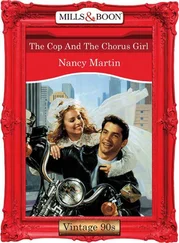Disher cleared his throat. “I’ve never received one of your job offers.”
Slade turned to him, apparently noticing him for the first time. “Do I know you?”
“You will,” Disher said confidently.
“Because you’re on the verge of making headlines by cracking a major case?” Slade asked, reaching out for a handshake.
“Because I’m going to send you my résumé,” Disher said, gripping Slade’s hand as hard as he could. I could see the effort on his face. There was none on Slade’s. “Lieutenant Randall Disher, Homicide.”
“Nice to meet you,” Slade said, managing to sound both polite and dismissive at the same time. He glanced at Stottlemeyer and tipped his head towards Disher. “So this is your right-hand man?”
“And his left,” Disher said before Stottlemeyer could answer. “Don’t let my boyish good looks fool you or you’ll be making the same mistake as a lot of guys on death row. I’m a grizzled, battle-scarred hard-ass.”
“I didn’t know that you were looking for a job,” Stottlemeyer said.
“Like any man of action, I’m always open to new challenges,” Disher said, releasing his grip on Slade’s hand and shaking the circulation back into his own. “You get too comfortable and your edges dull. I like to keep my edges razor-sharp.”
“Why don’t you go sharpen them by telling those officers to stop drooling on Nick’s car and to make sure no one else slips past the police line,” Stottlemeyer said.
“I’ll gladly whip them into shape,” Disher said, and shot Slade a look. “The rank and file don’t just respect me; they fear me. You know how it is.”
Disher swaggered over to the officers. I think he was trying to appear tough but instead it seemed like he was suffering from a hemorrhoid flare-up.
Slade shook his head. “Please reconsider my offer, Leland. At Intertect, you’d be working with the very best people in the investigative field.”
“That’s obvious,” Stottlemeyer said. “You’ve hired Adrian Monk.”
Slade looked past Stottlemeyer to Monk, who was swaying from side to side and holding his hands out in front of him. I couldn’t tell if he was fighting sleep or trying to look at things from a different perspective.
“The guy is brilliant, way beyond my expectations,” Slade said. “You wouldn’t believe how many cases he’s solved for us in just one day.”
“I would,” Stottlemeyer said. “So who’s your client?”
Slade smiled. “Ordinarily, I’d give you a moving speech about client confidentiality, but you’ll find out who it is soon enough from your sources at the county jail. It’s Salvatore Lucarelli.”
Stottlemeyer mulled that over for a moment. “I forgot to mention another benefit of being a cop. You don’t have kiss up to mobsters for work.”
“He came to me. I’m like a lawyer, Leland. I don’t judge my clients. I just do the best job I can for them. He thinks he’s being set up and hired me to prove it. I either can or I can’t. I don’t see anything immoral, unethical, or criminal in that.”
“You know he’s responsible. Judge Stanton and Judge Carnegie were both going to preside over Lucarelli’s trial,” Stottlemeyer said. “And they were both executed gangland style.”
“By a woman,” Slade said. “When was the last time you heard of a mob boss hiring women to do his dirty work?”
“What makes you think it was a woman?” Stottlemeyer said.
“The same things that make you think so,” Slade said. “I know everything that you know, Leland.”
Slade looked over his shoulder at Monk, who circled the body, tilting and pirouetting like a ballerina on a music box.
“Maybe more,” Slade said. Stottlemeyer followed his gaze. “How about some quid pro quo?”
Stottlemeyer sighed, nodded his acceptance, and we all walked over to Monk. Disher joined us, too, trying to maintain his swagger.
“Hello, Captain,” Monk said. He had dark circles under his eyes and he looked even paler than usual.
“You look terrible,” Stottlemeyer said. “Are you sleeping?”
“I don’t think so.” Monk pinched himself. “No, I’m awake. I had my doubts for a minute. But thanks for checking. What can you tell me about what happened?”
“Not much more than what you see right here,” Stottlemeyer said, and nodded to Disher, who whipped out his notebook with an exaggerated flourish.
“Judge Carnegie took his dog out for a walk around eight a.m. today, as he does every morning. About eight fifteen, neighbors reported hearing gunshots. When they came out, they found the judge on the ground and the dog dragging him. They tried to get to the judge but the dog started barking and snarling and wouldn’t let them near him. The first uniforms on the scene called in some officers from Animal Control, who were about to tranquilize the animal when the wife showed up. The dog calmed down and she took him away.”
Stottlemeyer shook his head. “The uniforms should have let Animal Control tranquilize the dog and prevented the wife from seeing her husband like that. Instead, they traumatized the poor woman. What the hell were they thinking?”
“They were a couple of rookies,” Disher said.
“Who are going to get their heads handed to them by me as soon as we’re done here,” Stottlemeyer said.
“Were there any witnesses to the shooting?” Monk asked.
Disher shook his head. “But it was probably the same hooded shooter. One of the bullets went through Judge Carnegie’s body and was recovered by the forensics unit. Just from eyeballing it, the ballistics expert is pretty sure the slug came from the same gun that was used to kill Judge Stanton. They’ll confirm it once they get the bullet back to the lab.”
Monk rolled his shoulders. “Why would the killer use the same gun?”
“Because it’s his gun,” Disher said.
“Her gun,” Monk corrected.
“Lucarelli is sending a message,” Stottlemeyer said. “He wants to be absolutely sure that we all know the killings are connected and that there will be more to come if we don’t let him walk. For a man his age, the minimum prison term for his crimes might as well be a life sentence. He’ll die behind bars.”
“Where does Judge Carnegie live?” Monk asked.
Disher pointed over Monk’s shoulder. “At the end of the street, just around the corner.”
Monk glanced back at the body. So did I. And I immediately realized what the bloody swath on the sidewalk meant.
“The dog was trying to drag his master back home,” I said. “My God, that’s heartbreaking.”
Monk looked back at Disher. “Did anyone hear anything besides the gunshots?”
“They didn’t hear any screams or cars screeching away, if that’s what you’re asking.”
Monk nodded and straightened up ever so slightly. And I knew in that instant that the mystery was solved. Don’t ask me how, but I did. It wasn’t just me. I glanced at Stottlemeyer and I could see that he knew it, too.
“What?” Slade asked, catching the shared look between the two of us. “What am I missing?”
“Monk knows who killed Judge Carnegie,” Stottlemeyer said.
“And Judge Stanton,” Monk said matter-of-factly.
Slade leaned towards Monk. “Whisper it in my ear.”
“What happened to the quid pro quo?” Stottlemeyer said.
“I don’t whisper in ears,” Monk said.
“Why not?” Slade said.
“I might accidentally inhale some earwax,” Monk said. “And die.”
“You can’t die from earwax,” Slade said.
“I can,” Monk said with a yawn.
Disher offered Monk his notebook and pen. “You could write it down.”
Stottlemeyer swatted the notebook out of Disher’s hand. “We want to know who did it, too.”
Читать дальше
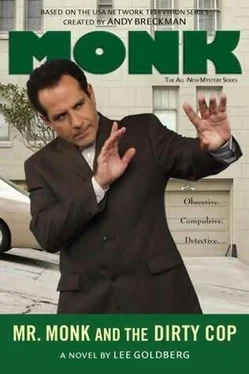


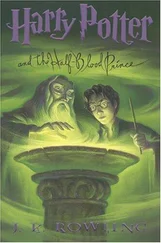
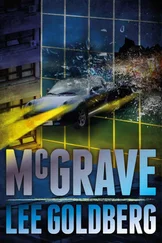
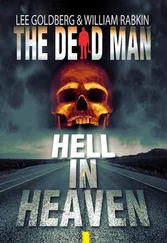

![О Генри - Фараон и хорал [The Cop and the Anthem]](/books/415669/o-genri-faraon-i-horal-the-cop-and-the-anthem-thumb.webp)




